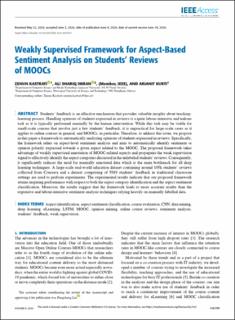| dc.contributor.author | Kastrati, Zenun | |
| dc.contributor.author | Imran, Ali Shariq | |
| dc.contributor.author | Kurti, Arianit | |
| dc.date.accessioned | 2020-10-28T08:18:05Z | |
| dc.date.available | 2020-10-28T08:18:05Z | |
| dc.date.created | 2020-06-19T11:33:18Z | |
| dc.date.issued | 2020 | |
| dc.identifier.citation | IEEE Access. 2020, 8 106799-106810. | en_US |
| dc.identifier.issn | 2169-3536 | |
| dc.identifier.uri | https://hdl.handle.net/11250/2685403 | |
| dc.description.abstract | Students' feedback is an effective mechanism that provides valuable insights about teaching-learning process. Handling opinions of students expressed in reviews is a quite labour-intensive and tedious task as it is typically performed manually by the human intervention. While this task may be viable for small-scale courses that involve just a few students' feedback, it is unpractical for large-scale cases as it applies to online courses in general, and MOOCs, in particular. Therefore, to address this issue, we propose in this paper a framework to automatically analyzing opinions of students expressed in reviews. Specifically, the framework relies on aspect-level sentiment analysis and aims to automatically identify sentiment or opinion polarity expressed towards a given aspect related to the MOOC. The proposed framework takes advantage of weakly supervised annotation of MOOC-related aspects and propagates the weak supervision signal to effectively identify the aspect categories discussed in the unlabeled students' reviews. Consequently, it significantly reduces the need for manually annotated data which is the main bottleneck for all deep learning techniques. A large-scale real-world education dataset containing around 105k students' reviews collected from Coursera and a dataset comprising of 5989 students' feedback in traditional classroom settings are used to perform experiments. The experimental results indicate that our proposed framework attains inspiring performance with respect to both the aspect category identification and the aspect sentiment classification. Moreover, the results suggest that the framework leads to more accurate results than the expensive and labour-intensive sentiment analysis techniques relying heavily on manually labelled data. | en_US |
| dc.language.iso | eng | en_US |
| dc.publisher | Institute of Electrical and Electronics Engineers (IEEE) | en_US |
| dc.rights | Navngivelse 4.0 Internasjonal | * |
| dc.rights.uri | http://creativecommons.org/licenses/by/4.0/deed.no | * |
| dc.title | Weakly Supervised Framework for Aspect-Based Sentiment Analysis on Students’ Reviews of MOOCs | en_US |
| dc.type | Peer reviewed | en_US |
| dc.type | Journal article | en_US |
| dc.description.version | publishedVersion | en_US |
| dc.source.pagenumber | 106799-106810 | en_US |
| dc.source.volume | 8 | en_US |
| dc.source.journal | IEEE Access | en_US |
| dc.identifier.doi | 10.1109/ACCESS.2020.3000739 | |
| dc.identifier.cristin | 1816293 | |
| dc.description.localcode | This work is licensed under a Creative Commons Attribution 4.0 License. For more information, see https://creativecommons.org/licenses/by/4.0/ | en_US |
| cristin.ispublished | true | |
| cristin.fulltext | original | |
| cristin.qualitycode | 1 | |

